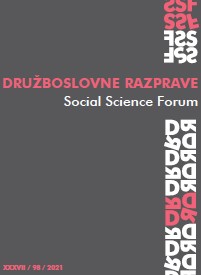DEJAVNIKI (NE)KOOPERATIVNOSTI PRI PREMAGOVANJU PANDEMIJE COVIDA-19 V SLOVENIJI
FACTORS OF COOPERATION AND DEFECTION IN OVERCOMING THE COVID-19 PANDEMIC IN SLOVENIA
Author(s): Marjan Smrke, Mitja Hafner-FinkSubject(s): Civil Society, Government/Political systems, Security and defense, Health and medicine and law
Published by: Slovensko sociološko društvo (in FDV)
Keywords: COVID-19 pandemic; public goods dilemmas; cooperation; defection;
Summary/Abstract: Slovenia has been one of the worst affected European states as regards per capita fatalities from COVID-19. We analysed data from two public opinion surveys in an effort to find a sociological explanation for this situation. Approaching the pandemic as a case of a public goods dilemma, we distinguished cooperative from non-cooperative players (citizens) in terms of their (reported) level of respect for a set of measures of safe behaviour. Cooperation declined during the second wave of the pandemic (compared to the first one), with the number of victims dramatically increasing. Stronger cooperation is positively correlated with (more advanced) age and (greater) concern for health (fear). Weaker cooperation or defection is correlated with youth and less trust in the government. Analysis of public opinion surveys has its strengths and limitations. Additional explanations for Slovenia’s relative failure should be researched using other methods as well.
Journal: Družboslovne razprave
- Issue Year: 37/2021
- Issue No: 98
- Page Range: 95-117
- Page Count: 23
- Language: Slovenian

